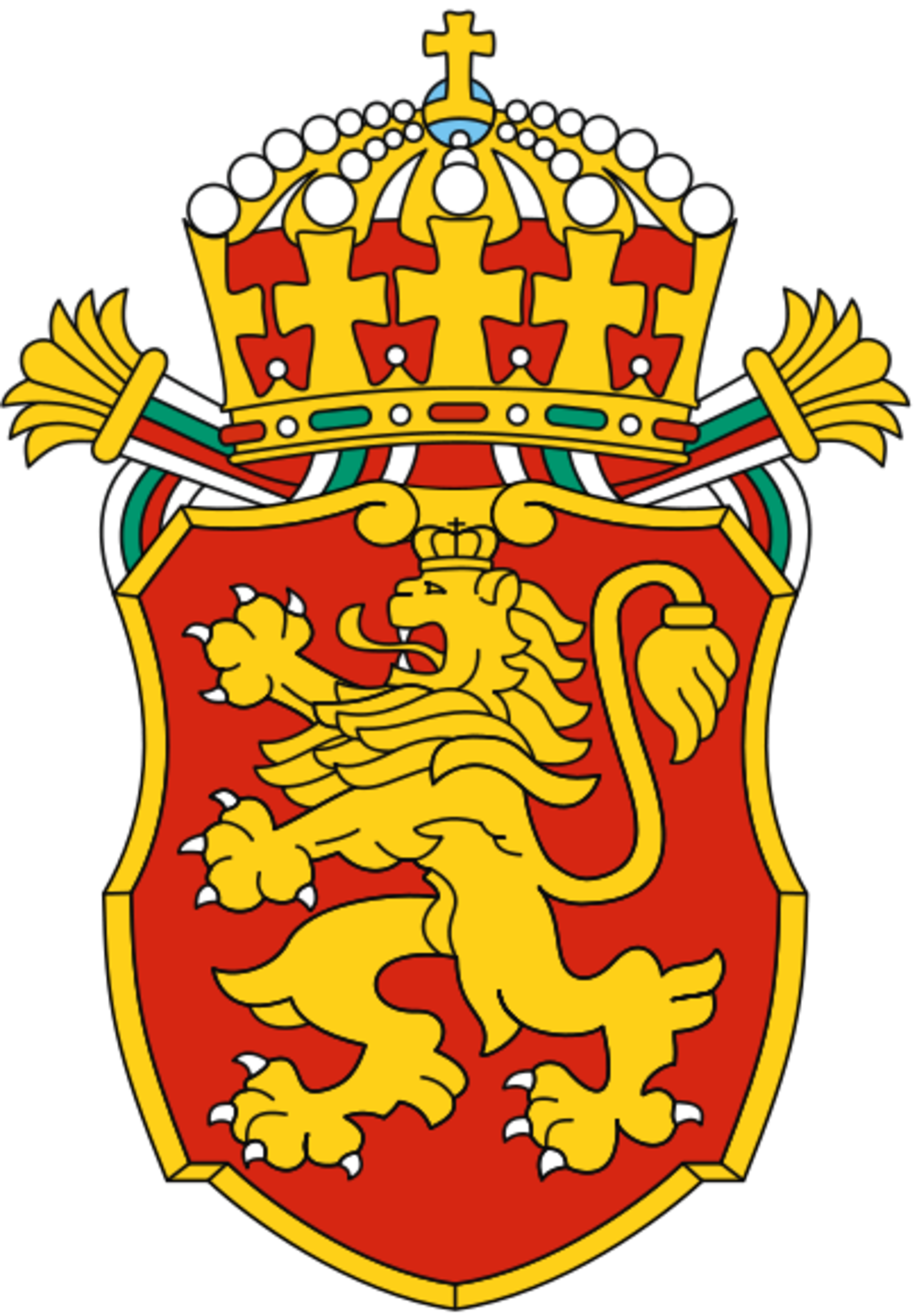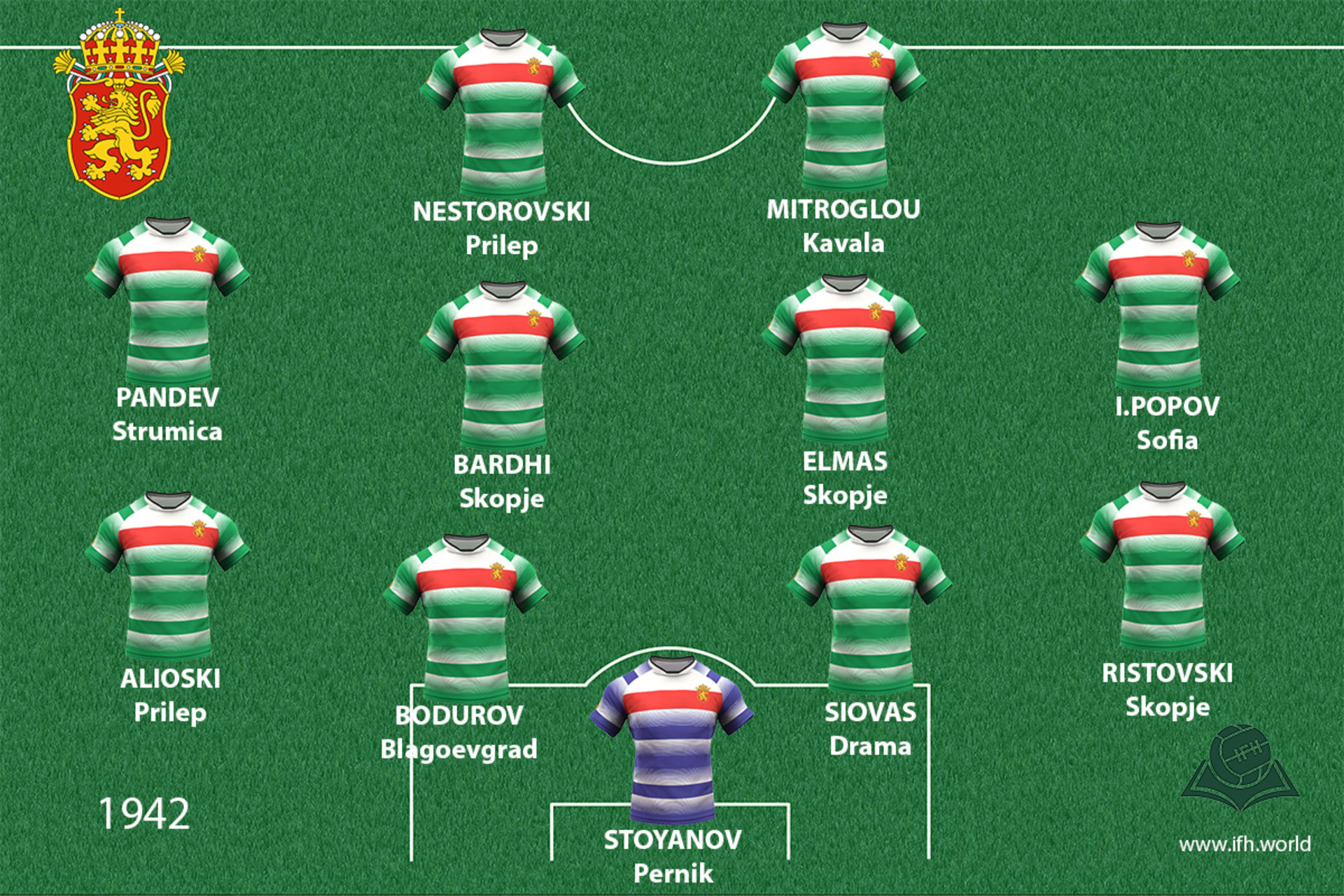Bulgaria
Bulgaria had to choose between friendship with either Germany or the USSR. Neither king Boris nor his ministers had any doubts that the former would be safer and more profitable. The danger of a possible German invasion and the promise of territorial gains, however, seemed to be a good reason for Bulgaria to become a German ally in March 1941.

Coat of arms
Shirt
| Position | First name | Last name | Mjesto rođenja | Like | Dislike |
|---|
(Today: Bulgaria, North Macedonia, northern parts of the Greece)
German troops used Bulgaria as a base from which to attack Yugoslavia and Greece.[1] Bulgaria’s reward for its complicity in these attacks was the restoration of the western territories lost in 1918, western Thrace, including the islands of Samothrace and Thassos, and the acquisition of all of Yugoslav Macedonia.[2] Most Bulgarians rejoiced at what they saw as the reunification of their historical lands and Boris himself was dubbed, ‘King Unifier’.[3]
Like every european national ideologist, especially in the Southeastern Europe, the Bulgarian national ideologies also had took out the context of time the vast medieval Bulgarian Empire by representing its contemporary national state as the legitimate successor of the territory which this medieval creation encompassed. Such thoughts posed a potential threat to all of its neighboring states, and the end of the ambition for the creation of Great Bulgaria will not represent a much smaller territory after the Berlin Congress (1878), nor the bitter losses of the Second World War of the Balkans and the First World War. [4]
Initially most Macedonian Slavs saw no reason to object to inclusion in Bulgaria; it would, they hoped, be a relief from the centralization and serbianization imposed by Yugoslavia.[5] But the insurmountable problem was that the thought of a separate Macedonian nation had begun to form among them. Since the cultures were closest to the Bulgarians, the construction of the Macedonian nation had an anti-Bulgarian line. In general, Bulgarian, as well as Serbian and Greek, political and "scientific" circles have been persistent in denying the Macedonian nation, emphasizing that it is a "false nation". Bulgarians claimed that the Macedonian language was just a Bulgarian dialect, the Serbs considered them as "southern Serbs", while for example, the Greeks, inheriting the tradition of celebrated antiquity, point to "unprecedented" Macedonianism, like most modern Greeks have some "original" Greek origin. [6]
Personal non-party rule of King Boris III was not fascist or totalitarian. Although, Bulgarian regime can be called as ''monarcho-fascism'' during the World War II.[7] Anti-communism and anti-Sovietism constituted major ideological features of Bulgarian monarcho-fascism. Also, Anti-Jew Law for the Defense of the Nation was adopted. Other features ogf the regime were its anti-liberalism and the undermining of the authority of the National Assembly, the elimination of the party system and the ban on the parties (starting in 1934). The main peculiarity of Bulgarian monarcho-fascism and its concept of a ''new state'' was that the monarch was promoted as a supreme leader-Fuhrer and accordinagly became the object of a cult.[8] There was no ruling party; the National Assembly, manipulated though it was, always included opposition deputies; control over left-wing politicians was harsh, but there were restrictions on right-wing extremist as well. Also, It was based on religion instead of some new cultural mysticism.[9]
No matter how it is judged, there was no occupation (de jure or de facto) by German troops. There was no puppet (or quisling) regime either, meaning one selcted and installed by Hitler, as in Slovakia or Norway or Croatia. Even collaborationism of the Vichy type of regime was absent. What there was instead was a regime with its own prewar history, local roots and legitimacy, perhaps strongly dependent and a ''satelite'', but at the same time a self-willed ally of Hitler.[10] Prime Minister Bogdan Filov himself was believer in Nazism. But this does not mean that he and his colleagues in the goverment were German agents; they sincerely believed that they were acting in the national interest and that collaboration with Germany was accorance with that interest.[11]
- [1] ''Bulgaria. World War II'', https://www.britannica.com/place/Bulgaria/World-War-II#ref476563
- [2] R. J. CRAMPTON, Bulgaria, Oxford University Press Inc., New York, 2007.,259
- [3] Isto 259
- [4] Felipe FERNANDEZ-ARMESTO, Narodi Europe, Zagreb, 1997.,222-223
- [5] R. J. CRAMPTON, Bulgaria, Oxford University Press Inc., New York, 2007, 259
- [6]Marko PIJOVIĆ, ''Demistificiranje ''etniciteta'' '', Historijska traganja, 10/2012., 111
- [7] Roumen Daskalov, Modern Bulgarian History: From Stambolov to Zhirkov, CEU Press, Budapest -New York, 2011, 165
- [8] Isto 167
- [9] Isto 171
- [10]Isto 182
- [11] Isto 185
Sources
- J. CRAMPTON, Bulgaria, Oxford University Press Inc., New York, 2007.
- Ulf BRUNNBAUER, ''Drevna nacionalnost i vjekovna borba za državnost: historiografski mitovi u Republici Makedoniji'', Historijski mitovi na Balkanu (ur. Husnija Kamberović), 2003, Sarajevo.
- Roumen Daskalov, Modern Bulgarian History: From Stambolov to Zhirkov, CEU Press, Budapest -New York, 2011.
- Felipe FERNANDEZ-ARMESTO, Narodi Europe, Zagreb, 1997.
- Marko PIJOVIĆ, ''Demistificiranje ''etniciteta'' '', Historijska traganja, 10/2012.
- ''Bulgaria. World War II'', https://www.britannica.com/place/Bulgaria/World-War-II#ref476563
- ''Military history of Bulgaria during World War II'', https://en.wikipedia.org/wiki/Military_history_of_Bulgaria_during_World_War_II
